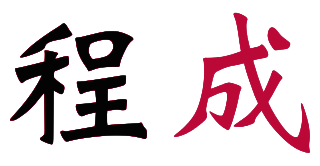Wu Wenying may refer to:
- Wu Wenying (poet) , Chinese poet during the Song dynasty.
- Wu Wenying (politician), Chinese politician and minister of textile industry.
Wu Wenying may refer to:
Year 223 (CCXXIII) was a common year starting on Wednesday of the Julian calendar. At the time, it was known as the Year of the Consulship of Maximus and Aelianus. The denomination 223 for this year has been used since the early medieval period, when the Anno Domini calendar era became the prevalent method in Europe for naming years.

劉 / 刘 is an East Asian surname. pinyin: Liú in Mandarin Chinese, Lau4 in Cantonese. It is the family name of the Han dynasty emperors. The character 劉 originally meant 'kill', but is now used only as a surname. It is listed 252nd in the classic text Hundred Family Surnames. Today, it is the 4th most common surname in Mainland China as well as one of the most common surnames in the world.

Cheng can be a transcription of one of several Chinese surnames. Since the syllable Cheng represents different sounds in Hanyu pinyin and the Wade–Giles systems of Chinese romanization, some ambiguity will exist as to which sound is represented by the letters "Cheng" if the romanisation and tone is not known. Also within each system of romanisation, each syllable can represent one of several different characters, as with any Chinese syllable.

Xue is the pinyin romanization of the Chinese surname 薛 (Xuē). It is romanized as Hsüeh in Wade-Giles. In Hong Kong and Macau it is usually romanized through its Cantonese pronunciation Sit. In Korean, it corresponds to Seol (설), in Japanese to Setsu and in Vietnamese to Tiết. in Indonesia and Netherlands, it is commonly spelled as Siek. According to the 2010 Chinese Census, it is the 76th most common surname in China, a sharp decline from 48th in 1982. In a study by geneticist Yuan Yida on the distribution of Chinese surnames, people who carry the name Xue are dispersed throughout the country and is most heavily concentrated in Shanxi. It is the 68th name on the Hundred Family Surnames poem.

Li-Young Lee is an American poet. He was born in Jakarta, Indonesia, to Chinese parents. His maternal great-grandfather was Yuan Shikai, China's first Republican President, who attempted to make himself emperor. Lee's father, who was a personal physician to Mao Zedong while in China, relocated his family to Indonesia, where he helped found Gamaliel University. In 1959 the Lee family fled Indonesia to escape widespread anti-Chinese sentiment and after a five-year trek through Hong Kong and Japan, they settled in the United States in 1964. Li-Young Lee attended the University of Pittsburgh, the University of Arizona, and the State University of New York at Brockport.

Wú is the pinyin transliteration of the Chinese surname 吳, which is a common surname in Mainland China. Wú (吳) is the sixth name listed in the Song Dynasty classic Hundred Family Surnames. In 2019 Wu was the ninth most common surname in Mainland China. A 2013 study found that it was the eighth most common surname, shared by 26,800,000 people or 2.000% of the population, with the province having the most being Guangdong.

Gu is a Chinese family name. Some places such as South Korea, and early immigrants from Wu-speaking region in China usually romanize this family name as "Koo" or "Ku". It is the 93rd name on the Hundred Family Surnames poem.
Dadu may refer to:
Shao is a common Chinese family name. It is the 86th most populous family name in China. It corresponds to last name So in Korean; "Thiệu" or "Thiều" in Vietnamese; “Zau” in Wu Chinese/Shanghainese and Siu, Chow, or Sho in other Chinese romanisations. The origin of the family name Shao is thought to have come from the royal lines of the Zhou Dynasty in ancient China. The King's loyal subject Duke of Shao (召公), was thought to have originated the Shao lines.
Yu is the pinyin romanisation of several Chinese family names. However, in the Wade–Giles romanisation system, Yu is equivalent to You in pinyin. "Yu" may represent many different Chinese characters, including 余, 于, 由, 魚 (鱼), 漁(渔), 楀, 俞(兪), 喻, 於, 遇, 虞, 郁, 尉, 禹, 游, 尤, 庾, 娛(娱), and 茹 (Rú).

Pān is the Mandarin pinyin romanization of the East Asian surname 潘. It is listed 43rd in the Song dynasty classic text Hundred Family Surnames. It is romanized as P'an in Wade–Giles; Poon, Phoon, Pon, or Pun in Cantonese; Phua in Hokkien and Teochew.

Qiu or Chiu is the Hanyu Pinyin and Wade-Giles transliteration, respectively, of the Chinese surnames 丘/邱, and 秋. Qiu (丘) is a common surname in China. It is also one of the most influential surnames in Taiwan (邱), as well as the Sichuan and Fujian provinces in the South China region. They may be transliterated in various forms, as:
Ke is a Chinese surname. It originally appeared on the Hundred Family Surnames. As of 2006 was no longer one of the top 100 most common surnames. A 2013 study found that it was the 145th most common surname, shared by 1.06 million people or 0.080% of the population, with the province most being Hubei. It is also spelled as Quah, Qua, Kua, Kuah, Kwa, Ke, Ker, Ko, Kok, Or or O in English.
Liu Ji may refer to:
Evening Rain is a 1981 Chinese drama film which reflects the fight between Chinese people and the Gang of Four during the ten years of turmoil in China. It was directed by Wu Yonggang and Wu Yigong with Li Zhiyu, Zhang Yu, Lin Bin playing the leading roles. This movie won the first Golden Rooster Awards for the Best Picture in 1981, a prize shared with Xie Jin's Legend of Tianyun Mountain.

Shěn is the Mandarin Hanyu pinyin romanization of the Chinese surname 沈.
Wu Cheng'en and Journey to the West is a Chinese television series about the life of Wu Cheng'en and his inspiration for writing the 16th-century novel Journey to the West. The series was directed by Kan Weiping and consists of a total of 45 episodes shot in high definition, each 45 minutes long and containing 10 minutes of 3-D effects. The original lead actors of the 1986 television series Journey to the West starred in Wu Cheng'en and Journey to the West and reprised their roles: Liu Xiao Ling Tong as Sun Wukong, Chi Chongrui as Tang Sanzang and Ma Dehua as Zhu Bajie. Sha Wujing, however, was portrayed by Liu Dagang because the original actor, Yan Huaili, died in April 2009. It was broadcast by Shandong Qilu TV in July 2010.

Lu is the pinyin and Wade–Giles romanization of the Chinese surname written 陆 in simplified character and 陸 in traditional character. It is also spelled Luk or Loke according to the Hong Kong Cantonese pronunciation. Lu 陆 is the 61st most common surname in China, shared by 4.2 million people. Most people with the surname live in southern China; 44% live in just two provinces: Jiangsu and Guangxi. Lu 陸 is listed 198th in the Song dynasty classic text Hundred Family Surnames.
Wu Wenying was a Chinese politician who served as minister of textile industry from 1983 to 1993.
Mong or Meng is a Chinese surname. It is a xing (姓). The surname is typically romanised as Meng in Mandarin and Mong or Mung in Cantonese. Other romanisations include Mông, Muhng, Mang, and Bong.